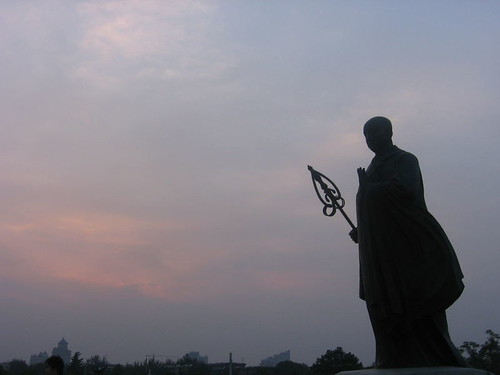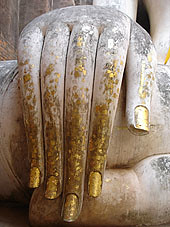The Other Shore... Leave your Boat at The Water

“As a Buddhist, how do you feel about……” someone began to ask me, thinking that being Buddhist, every opinion and idea of my worldview would conform to one Buddhist ideal, and thus the one could represent the many. Not only are there many philosophies and viewpoints within Buddhism itself, each individual only has a certain awareness of these philosophies that expand over time as awareness grows and wisdom is gained.
Accepting a viewpoint only because it is the viewpoint of our
Empiricism is at the heart of the Buddhist path. This examination is not done for us, but is done at the individual level. In other words, we cannot sit next to our teacher and gain insight. We must seek, and this seeking can take time. While examining one aspect of Buddhist thought, I found it to be against the grain with the remainder of the teachings. Perhaps this was just inexperience, or lack of insight, but this idea did not seem to coalesce with the basic philosophy. In time I learned that this aspect was a cultural one, a part of that people long before the introduction of Buddhism, now dispensed as a part of Buddhist teachings/religion, now not recognized as a part of culture. We must be careful not to adopt these cultural adaptations. They are all the more dangerous when they take the form of religious practices.
Outside of Buddhism, another example I could offer is the Judeo-Christian idea of Heaven. In my personal understanding, Heaven cannot exist along side of Hell for a being with a store of merit of compassion and loving-kindness. Such a being, fulfilling all necessary actions to reach heaven, will be there for eternity. This being has, over one lifetime or many, dedicated practice towards the alleviation of suffering of other beings, and it stands to reason that this being will have a strong motivation to help those who will suffer for an eternity in hell. A lifetime of peace is little good to a being dedicated to the welfare of others. For this bodhisattva, heaven would become hell, trapped for eternity without means to help those who suffer in hell, tortured every day of their existence. I, for one, would much rather give my up my chance in heaven and spend an eternity in hell, teachings others how to be mindful of pain and learn to alleviate the suffering of even that existence. In other words, for Heaven to be a place devoid of suffering, it would need to be a place full of self-oriented individuals. Satan or Yama, they are not exempt. [This all excludes the fact that other realms are beyond the understanding of man, but given that Heaven is written in worldly terms, I give myself permission to speak so here.]
Humanity has always fallen victim to certain predispositions, and no matter what efforts any religion or philosophy makes to circumvent these, they appear nonetheless. Buddha, like so many other leaders of his time, was very clear when he asked that none of the sangha make images of him, and so the sangha made images of his feet or of lotuses instead. It wasn’t long, however, before temples has full-fledged Buddha statues. Priests and monks will claim that Buddhists do not worship the Buddha, but one must take into consideration that in large populations, many will fall victim to the same predispositions of humanity, no matter the religion. It wasn’t long before laymen all over
For beginners, it is common to see their boats heavily fettered to the dock, attached by preconceived ideas of Buddhism, religious practices, teachings, methods, mantras, initiations, postures, etc. The words expounded by the Buddha would float lightly of the seas, but the religions of today, weighed down with identity, would quickly sink. The beginner who can stay away from this baggage will hold strong wind on their sail.
Those who have crossed the shore have not left the boat at the other side as the Buddha warned, but carry it over their heads like a beacon, bumping into each other in the forest.
“Look out! Student of This! Rinpoche coming through.”
“I studied This! Zen at This!
“I have had initiations from many famous masters, so I should have the right of way.”
‘Here are my beliefs,' they all cry, boats overhead.
With the name they also carry the ideas, methods, religious practices, and sometimes even mannerisms of their particular boat.
The forest has more boats than the water. We fall back into religious practice, seeking the form and method, like the baby looking for the womb. We do not continue to hold up our realities to question, but instead form other conventional realities that look less like what we left, and more like what we think a Buddhist world should look like. We become happy in our bubble for a time.
The world we have constructed is not emptiness but a shadow concealing ego, as religion takes form and root once again. We cannot believe that our path is the same path demarcated as 1000 others. What has ever worked this way? Can we truly believe that the highest levels of liberation will reveal themselves in this way, like a paved highway that we will all follow together? When Maitripa passed, Atisha mourned the loss, realizing that no other teacher in
Do we change Buddhism? Of course not. We cannot. To change this course one would need to change humanity as a whole. Those that seek a path without distinction, without barriers, without form, without degree, will cast a light in the forest and those not blinded by their own beacon of tradition and faith will nod, gather a few words of advice, pass on a few, and be on their way. But do not pass on darkness, only light.
Philosophy,Religion,Buddhism,Zen,Consciousness,,Weblog,Blog
Philosophy,Religion,Buddhism,Zen,Consciousness,Weblog,Blog


























